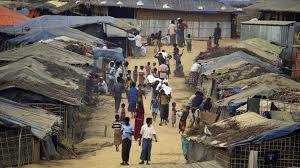First COVID-19 case found in Rohingya refugee camps in Bangladesh

Stay tuned with 24 News HD Android App

A Rohingya man has become the first person to test positive for COVID-19 in the vast refugee camps in Bangladesh that is home to almost one million people, officials said Thursday.
Health experts have long warned that the virus could race through the cramped, sewage-soaked alleys of the camps in the Cox's Bazar district, where the persecuted Muslim minority have been housed in canvas and bamboo shacks since they fled a military offensive in neigbouring Myanmar more than two years ago.
Local health coordinator Abu Toha Bhuiyan initially said two refugees had been put into isolation.
The World Health Organisation later said one case was of a Rohingya man, and the other was of a local man who lived near the camp and was being treated at a clinic inside the area.
"One patient is from the refugee population and the other one from the surrounding host population," WHO spokesman Catalin Bercaru told AFP.
Bercaru said "rapid investigation teams" were being deployed to follow up on the two cases. The patients' contacts are being traced for quarantine and testing.
Local authorities said prevention measures and testing were being stepped up.
Hotspots of misinformation
In early April authorities imposed a complete lockdown on the surrounding Cox's Bazar district after a number of COVID-19 cases, restricting all traffic in and out of the camps.
Police and soldiers set up roadblocks on the main roads of the district, home to 3.4 million people including the Rohingya refugees, and conducted patrols inside and around the camps.
Authorities in Bangladesh also forced aid organisations to slash their camp presence by 80 percent.
Rights groups and activists have expressed concerns that the camps are hotspots of misinformation about the pandemic because of an internet ban imposed in September 2019.
Refugees International senior advocate for human rights, Daniel Sullivan, said the first case was the "realisation of a nightmare scenario".
The Bangladesh government "should immediately lift phone and internet restrictions in the camps that are holding back vital communications," he said in a statement.
"Rumours abound in the camps that COVID-19 is always fatal or that the faithful will be safe. Open communication is critical to promoting hygiene awareness and tracking the spread of the disease."
Another charity that works with refugees, Save the Children, said the pandemic had shown how vulnerable the refugees were.
"Now that the virus has entered the world's largest refugee settlement in Cox's Bazar we are looking at the very real prospect that thousands of people may die from COVID-19," the aid agency's Bangladesh health director Shamim Jahan said in a statement.
In the Rohingya refugee camps "there are no intensive care beds at this moment," Jahan said.
The first novel coronavirus case was confirmed in Bangladesh in early March, and the outbreak has since worsened with at least 283 people dead and nearly 19,000 infected -- figures some experts say understate the true scale of the health crisis.
The government has enforced a nationwide lockdown since March 26 in an effort to check the spread of the disease.
Despite the shutdown, the number of cases has risen sharply in recent days and the daily death toll and new infections hit a record on Wednesday.
More than 740,000 Rohingya fled a brutal 2017 military crackdown in Myanmar and resettled in the squalid refugee camps of Cox's Bazar, where around 200,000 refugees were already living.
